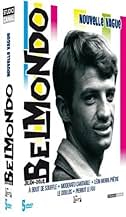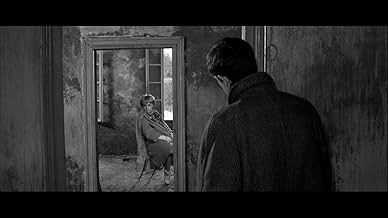Moderato cantabile
- 1960
- 1h 35min
NOTE IMDb
6,9/10
1,4 k
MA NOTE
Une femme riche et oisive est témoin d'un meurtre passionnel et rencontre un autre témoin. Elle l'interroge sur l'histoire de la victime et s'éprend de lui.Une femme riche et oisive est témoin d'un meurtre passionnel et rencontre un autre témoin. Elle l'interroge sur l'histoire de la victime et s'éprend de lui.Une femme riche et oisive est témoin d'un meurtre passionnel et rencontre un autre témoin. Elle l'interroge sur l'histoire de la victime et s'éprend de lui.
- Réalisation
- Scénario
- Casting principal
- Récompenses
- 1 victoire et 1 nomination au total
Avis à la une
This has to be one of the dullest films of the early Sixties. Remember that Godard, Malle, Truffaut and company had been challenging the traditions of story telling; the world seemed young again, and full of possibilities. Moderato cantabile has nothing of this spirit. It might have been made by an old-guard director like Clément or Delannoy (if they had decided to take a chance on a Duras script).
There isn't much energy or interest in this story: what happens in the first ten minutes is endlessly rehashed throughout the remainder. Belmondo is ill at ease here, or at least seems that way to me--there is no chance for any extroversion, exuberance or even anger from the character. Jeanne Moreau is used decoratively (Brook must have seen what Resnais was able to do with Delphine Seyrig in Last Year In Marienbad) and always looks elegant, if never really desperate or anguished. You know something's wrong when the piano teacher provides much of the dramatic interest: she's bullying the child into giving her a Diabelli sonata "moderately, with a singing feeling".
Note: I have just remembered that Clément did do a Duras script (Barrage contre le Pacifique) in 1958.
There isn't much energy or interest in this story: what happens in the first ten minutes is endlessly rehashed throughout the remainder. Belmondo is ill at ease here, or at least seems that way to me--there is no chance for any extroversion, exuberance or even anger from the character. Jeanne Moreau is used decoratively (Brook must have seen what Resnais was able to do with Delphine Seyrig in Last Year In Marienbad) and always looks elegant, if never really desperate or anguished. You know something's wrong when the piano teacher provides much of the dramatic interest: she's bullying the child into giving her a Diabelli sonata "moderately, with a singing feeling".
Note: I have just remembered that Clément did do a Duras script (Barrage contre le Pacifique) in 1958.
Two beautiful ugly ones, or two ugly beautiful ones, a perfect couple on the screen. Neither Belmondo nor Jeanne Moreau were beauties, they had an immense personal charm that made them likeable. Plus a great talent in expressing with terrible ease what thousands of other actors struggle in vain to express. Both, Moreau and Belmondo, did not even need words, they could convey enormously just by their presence, just by a look. Two geniuses of cinematography who delighted my childhood in particular and my adult life, I saw almost all their films, only this "Moderato Cantabile" was missing because, made in 1960, I was too young, I was less than 2 years old at the time and I don't even know if it was in the cinemas in Bucharest. I found it on YouTube now in March 2025 and watched it with great interest, although I was very tired, with many hours of sleep minus. A very delicate film that is worth seeing. However, knowing the extremely low intellectual level of today, it will only be of interest to those who know who Moreau and Belmondo were.
the atmosphere. the Duras mark. the mark of Peter Brooks. and the performances. a Belmondo who conquest a special status, exploring a role who has the force of nuances. Jeanne Moreau - the same and different. the piano's lessons. and the city. a film about solitude in a honest, cruel manner. slices from Madame Bovary. and the search of sense in the presence of the other. the mixture of temptation and fear, expectation and sin, the form of illusion and the brutal end does it a gem. not only for the artistic virtues but for a special manner to use the novel for the portrait of a small world. a film of music as piece from silhouettes, dialogs and fall. a not real comfortable film. but useful.
Peter Brook acquired the rights to the successful Nouveau Roman 'Moderato Cantabile' from author Marguerite Duras as a vehicle for Jeanne Moreau with whom he had worked on stage in 'Cat on a Hot Tin Roof'.
Brook's previous film 'The Beggar's Opera' had hardly been a resounding success which made it difficult to get funding for this latest venture. However, thanks to the Herculean efforts of producer Raoul Levy the necessary funds came through.
Levy and his backers must surely have been disheartened by the films failure outside of France. Such a pity also that the film became lumbered with the ghastly alternative title of 'Seven Days....Seven Nights', the suggestiveness of which was obviously designed to get bums on seats.
Jeanne Moreau as Anne, the bored and unfulfilled wife of a rich industrialist, is attending a piano lesson at which her young son Pierre is struggling, under the stern eye of his piano teacher, to get to grips with the 'moderato cantabile' movement of a sonatina by Diabelli. They are interrupted by the blood-curdling scream of a woman in the bar next door who has presumably been murdered by her lover. Anne becomes intrigued by and obsessed with the crime and the reasons for it. She meets Chauvin, one of her husband's employees, who seems to offer an explanation and they begin what can only be described as a 'metaphysical' relationship which to Anne's despair, does not progress to the physical.......
This film comes within the Golden Age for stage-trained Jeanne Moreau that began with 'Lift to the Scaffold' for Louis Malle in 1957. Her performance here as Anne is utterly mesmerising and fully justifies her being described by Orson Welles as 'simply the greatest'.
As Chauvin Jean-Paul Belmondo is frankly miscast and by all accounts was bored and mystified by the whole enterprise. His instinctive talent and undeniable screen presence carry him through. Young Didier Haudepin is splendid as Pierre and would excel four years later in 'A Special Friendship', a forgotten masterpiece of Jean Delannoy. Colette Regis certainly makes an impression in her two scenes as Mlle Giraud the piano teacher.
The highlight of the film is the dinner party where Anne finally cracks, the direction of which by Brook is superlative. The final scene between Anne and Chauvin also leaves a deep impression.
Shot in lustrous black and white by Armand Thirard this is a compelling and haunting work the power of which lies in its restraint. Moreau's astonishing portrayal won her a Palme d'Or and the film itself marked the start of a long and fruitful collaboration with Marguerite Duras.
In 2001 she came full circle by playing Duras in 'Cet amour-la'.
"Moderato Cantibile" was only the second film by the great British director Peter Brook and it proved, like Welles before him, that he was equally adept in either medium. It was made in France in 1960 and has now largely been forgotten, though at the time the magazine Films and Filming selected it as the best film of the year from any source and it's a masterpiece. It's also one of the most beautiful black and white films to be made in the Cinemascope format. (Armand Thirard was the DOP).
It's about a respectable,if unhappily married, woman in a grim little coastal town in France who drifts into an affair of sorts with a man from farther down the social ladder. They are played, magnificently, by Jeanne Moreau and Jean-Paul Belmondo. The oblique, brilliant screenplay is by Marguerite Duras and Gerard Jarlot from a novel by Duras and anyone remotely interested in cinema as an art-form should seek it out.
It's about a respectable,if unhappily married, woman in a grim little coastal town in France who drifts into an affair of sorts with a man from farther down the social ladder. They are played, magnificently, by Jeanne Moreau and Jean-Paul Belmondo. The oblique, brilliant screenplay is by Marguerite Duras and Gerard Jarlot from a novel by Duras and anyone remotely interested in cinema as an art-form should seek it out.
Le saviez-vous
- AnecdotesAccording to biographer Olivier Todd, Peter Brook offered writer Albert Camus an acting job in Moderato cantabile. Camus died in a car accident before he could take it.
- GaffesIn original release copies the title card read "Moderato contabile", but they were not retired from circulation.
- Citations
Anne Desbarèdes: Try to remember: Moderato means gently - it's nearly the same - and Cantabile means melodiously. It's easy.
- ConnexionsFeatured in Jeanne M. - Côté cour, côté coeur (2008)
Meilleurs choix
Connectez-vous pour évaluer et suivre la liste de favoris afin de recevoir des recommandations personnalisées
- How long is Seven Days... Seven Nights?Alimenté par Alexa
Détails
- Durée1 heure 35 minutes
- Couleur
- Rapport de forme
- 2.35 : 1
Contribuer à cette page
Suggérer une modification ou ajouter du contenu manquant

Lacune principale
By what name was Moderato cantabile (1960) officially released in India in English?
Répondre



















